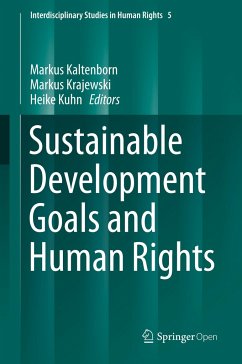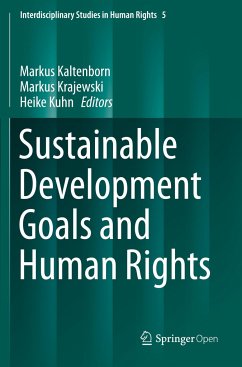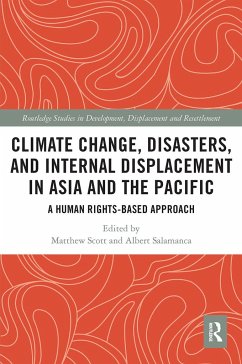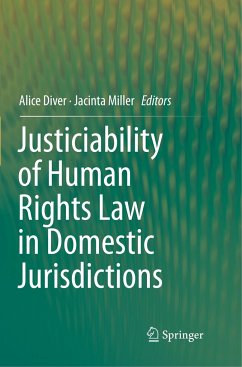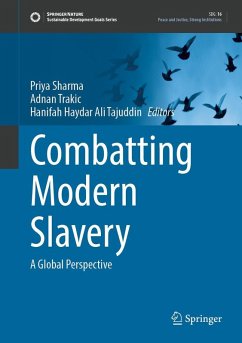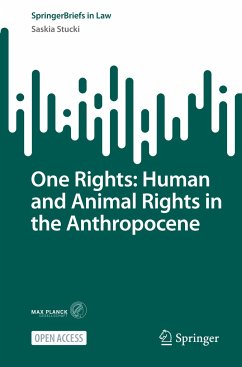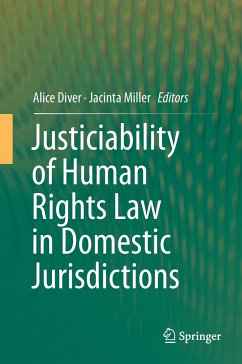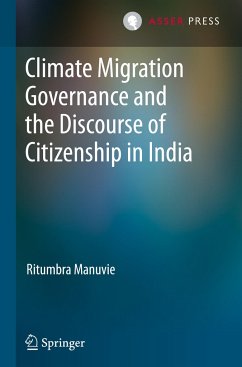
Climate-Related Human Mobility in Asia and the Pacific
Interdisciplinary Rights-Based Approaches
Herausgegeben: Jolly, Stellina; Ahmad, Nafees; Scott, Matthew
Versandkostenfrei!
Versandfertig in 6-10 Tagen
38,99 €
inkl. MwSt.

PAYBACK Punkte
19 °P sammeln!
This open access book critically examines the policies and practices related to climate-related human mobility in Asia-Pacific and the legal and policy protection framework for climatically displaced migrants (CDMs) through an interdisciplinary human rights-based approach. While covering the policy and theoretical dimensions of mobility, it also evaluates the issue through empirical studies. The book illustrates how interdisciplinary rights-based approaches address and identify gaps in the protection framework for the region regarding dimensions of climate change displacement, migration, force...
This open access book critically examines the policies and practices related to climate-related human mobility in Asia-Pacific and the legal and policy protection framework for climatically displaced migrants (CDMs) through an interdisciplinary human rights-based approach. While covering the policy and theoretical dimensions of mobility, it also evaluates the issue through empirical studies. The book illustrates how interdisciplinary rights-based approaches address and identify gaps in the protection framework for the region regarding dimensions of climate change displacement, migration, forced migration, susceptibility to climate change, and typology of climate change-induced displacement. Presenting multiple case scenarios, it recommends a legal mechanism based on human rights in a region brimming with variety and multiculturalism.
Bringing together voices from the Asia-Pacific Academic Network on Disaster Displacement, the book examines issues that are immediately relevant in countries where they are living and working. In addition to academic perspective, the chapters also bring perspectives from positions held in national human rights institutions and government. They bring insight into lived experience and policy processes, seeking to avert, minimize, and address displacement, including through general disaster risk reduction and climate change adaptation initiatives, as well as specific initiatives around emergency preparedness for response and planned relocation and resettlement. The chapters examine diverse forms of human mobility, including displacement, planned relocation, and forced immobility. The combination of studies focusing on both sudden onset and slower onset movement is also distinctive. With a thorough understanding of the interdisciplinary rights-based approaches to the issue, students, researchers, policymakers, administrators, and all those engaged in studying these topics can quickly evaluate and appreciate how the rights of CDMs are protected on a national, regional, and international level in Asia-Pacific.
Bringing together voices from the Asia-Pacific Academic Network on Disaster Displacement, the book examines issues that are immediately relevant in countries where they are living and working. In addition to academic perspective, the chapters also bring perspectives from positions held in national human rights institutions and government. They bring insight into lived experience and policy processes, seeking to avert, minimize, and address displacement, including through general disaster risk reduction and climate change adaptation initiatives, as well as specific initiatives around emergency preparedness for response and planned relocation and resettlement. The chapters examine diverse forms of human mobility, including displacement, planned relocation, and forced immobility. The combination of studies focusing on both sudden onset and slower onset movement is also distinctive. With a thorough understanding of the interdisciplinary rights-based approaches to the issue, students, researchers, policymakers, administrators, and all those engaged in studying these topics can quickly evaluate and appreciate how the rights of CDMs are protected on a national, regional, and international level in Asia-Pacific.





